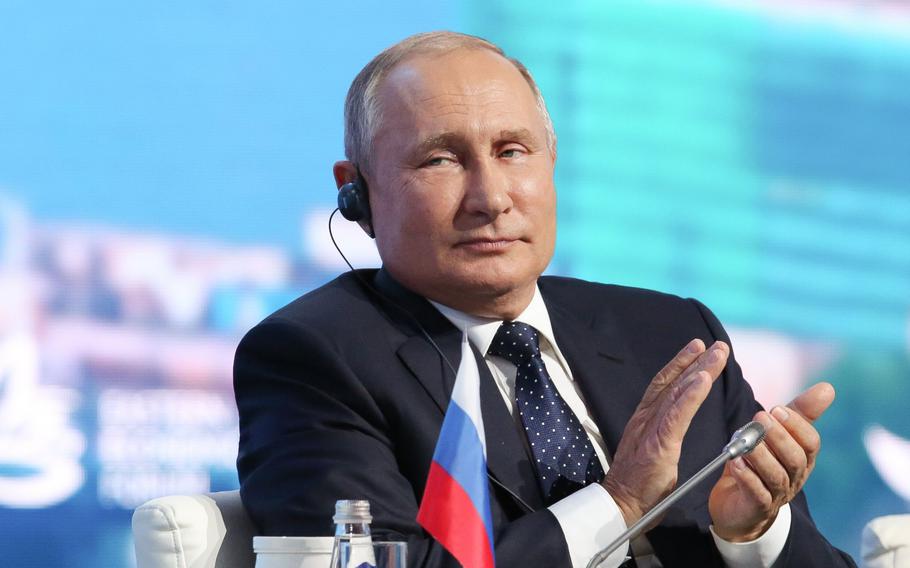
Vladimir Putin, Russia's president, at the Eastern Economic Forum in Vladivostok, Russia, on Sept. 5, 2019. (Andrey Rudakov/Bloomberg)
So far the Kremlin has kept the shift mostly rhetorical, unwilling to risk a military confrontation with Israel. But after years of tolerating Israeli strikes in Syria under former Prime Minister Benjamin Netanyahu, Moscow is eager to do more to bolster Syrian President Bashar al-Assad with a new government in Jerusalem.
Russian President Vladimir Putin “isn’t bound by any previous understandings” with Netanyahu, said Elena Suponina, a Moscow-based Middle East expert. Russia wants Israel to restrict its Syria strikes “and to coordinate the efforts against terror” groups, she said.
A more abrasive relationship could force Israel to change its strategy to prevent Iran from increasing its regional clout, or shift to alternative strike methods. It also risks inflaming political tensions between Putin and Israeli Prime Minister Naftali Bennett, who succeeded Netanyahu in June.
Russia’s assertiveness underscores its confidence in the Middle East since the 2015 military intervention in support of Assad against U.S.-backed rebels. While Israel routinely gives Moscow short notice of strikes to avoid harming Russian personnel in Syria, it doesn’t seek permission for military actions. Russia may intensify training for Syrian air defense crews to limit Israeli airstrikes against Iranian-backed militias, said a person close to the Defense Ministry in Moscow, asking not to be identified because the matter is confidential. The aim is to extract pledges from Bennett to coordinate Israeli actions with Russia’s military, said another person in Moscow familiar with the matter.
The two countries have clashed over Syria before. In 2018, despite acknowledging Syrian air defenses shot down a Russian aircraft killing 15 servicemen, Putin blamed Israel for the incident because its planes were attacking targets in Syria at the time. Russia moved advanced antiaircraft systems to Syria in response.
There’s no sign Israeli missions are being impeded now. While the Defense Ministry in Moscow claimed Syria’s Russia-supplied air-defense systems thwarted three Israeli attacks in the past two weeks, Israel and others said that’s untrue.
“We will continue to hit Iranian targets in Syria,” said Giora Eiland, former head of Israel’s National Security Council. “This has been one of Israel’s achievements against Iran in recent years and we aren’t going to give it back.”
The Russian claims prompted attacks from Bennett’s opponents over the operation of an informal accord with Russia that lets the Jewish state strike militias in Syria while avoiding conflict with Assad’s forces.
Spokespeople for Israel’s prime minister and Defense Ministry declined to comment.
The change of government “won’t have any impact on our relations,” Israeli Ambassador to Russia Alexander Ben Zvi said in an email.
It will be a challenge to reach agreements until the new Israeli premier builds personal ties with Putin, said Pinchas Goldschmidt, the Chief Rabbi of Moscow, who’s also president of the Conference of European Rabbis with contacts in both countries. Bennett and Putin first spoke three weeks after he became premier and they have yet to schedule a meeting. Netanyahu had 13 phone calls and met three times with Putin in his last two years in office alone, according to the Kremlin’s website.
His opposition Likud party seized on the controversy, saying if reports of Russian efforts to curtail Israel’s actions in Syria are correct, “then the failed government lost another strategic asset that Israel enjoyed during the Netanyahu government.”
“This is about imitating pressure on Israel rather than any real steps though we could move in this direction,” said Alexander Shumilin, a former Russian diplomat who heads the state-financed Europe-Middle East center in Moscow. “Still, there is no prospect of any serious confrontation with the Israelis.”
Russia will have to tell Israel if it wants to end the informal accord and “the bottom line is that nothing has changed,” said Zvi Magen, a former Israeli ambassador to Russia who’s now a senior researcher at The Institute for National Security Studies. “Russia knows that if it makes the change by force, Israel will react with force.”